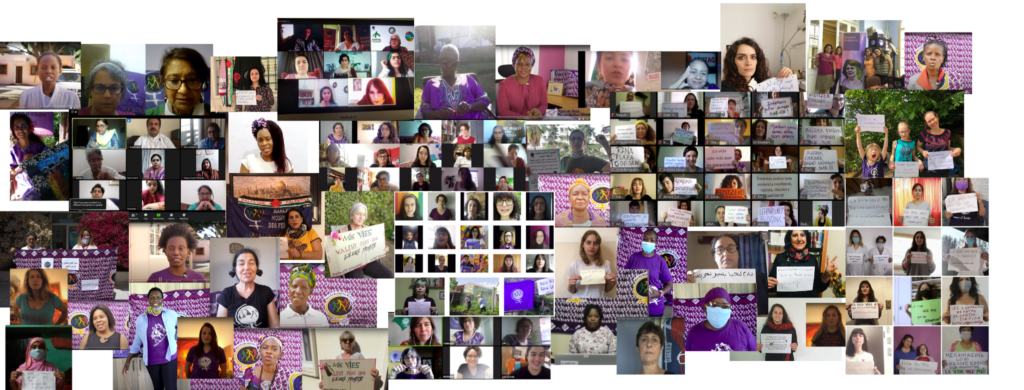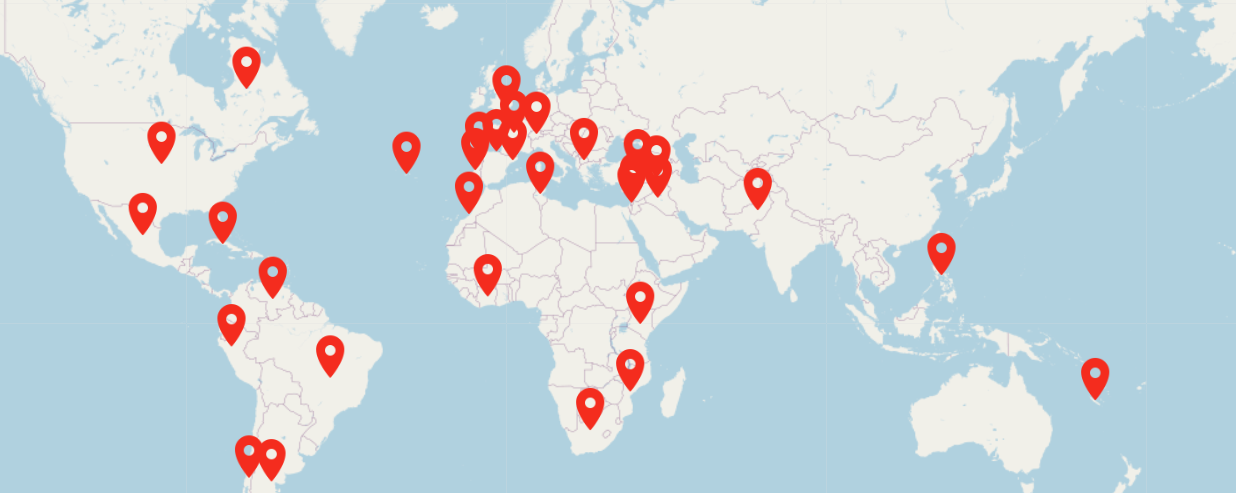
April 24 was a day of struggle in our 5th international action. The World March of Women in 32 countries and territories mobilised in 24h of Feminist Solidarity Against the Power and Impunity of Transnational Corporations. All the activities carried out are on this map — there are links to debates, publications, actions, web seminar, reports. The denunciation and confrontation with the transnationals continues as a theme of the closing of the 5th international action, on October 17th.
In discussing the corporations’ activities and their impacts on women’s lives, we see that the plundering of resources and the exploitation of workers, the destruction of rights and nature, the influence of corporate power on governments are constant around the world. And that our international movement gives us the strength to fight it. Take the example of mining companies. In our 24h of Feminist Solidarity, WMW Turkey organized a webinar with guests from the front line of struggles against transnational companies from different regions of the country. In the webinar, they explained how the functioning of transnational corporations in one country also impacts other territories. And also presented the violations committed by transnational corporations operating gold mines in the mountains of Kaz, Turkey.
In the late 1990s and early 2000s, transnational corporations were invited to explore these mines and received benefits and information from the government. The mining exploration concessions were sold at very low prices to three major gold mining companies, Alamos Gold, Cominco and Eldorado Gold. They have created Turkish companies and partners with Turkish names to look like local companies, but in reality they are transnationals with 100% foreign capital. Alamos Gold, Canadian, operates under two Turkish names in Turkey. Deforestation, huge empty wells, the climate crisis, the pollution of nature have sparked a massive reaction from populations and different forms of protests last year. Every Saturday, the local populations continue their protest. During the pandemic, they are using social media. The resistance has lasts for almost 300 days, despite many forms of oppression.
The Quebec sisters joined the chain of solidarity, as part of the 24h of feminist solidarity, to denounce the role of transnational corporations, in particular Canadian mining companies like Alamos Gold, with a video on mining. Three-quarters of the world’s mining companies are based in Canada and operate mega-projects in over 100 countries, regardless of borders, rights and the environment. The video shows women and communities resistance to extraction and their struggle for environmental and social justice, for the defense of life and territories, in internationalist solidarity.
The same goes to the textile industry. In their webinar, the Turkish sisters recalled that the textile and clothing industry in Bangladesh, where 90% of employees are women, is the result of climate change: after a series of disasters, floods and famine, Western governments decided to create an industry in this country, instead of providing humanitarian aid. Women in Turkey used this example to reflect on the impact of transnational corporations on the lives of many territories, whose strategy is to choose places of production where costs are low – to the detriment of workers’ rights.
The pandemic showed another aspect of these “market-led” strategies. In 2020 in Bangladesh, seven years after the collapse of Rana Square, women garment workers are protesting against layoffs and non-payment of wages because orders for clothes have collapsed. Once again, the cost is falling on the backs of the workers.
Our companions in Pakistan described, in a webinar on April 24th, the situation of women cotton pickers, who work in a harsh climate, with a minimum wage, exposing themselves to various pesticides sprayed on cotton by farmers. Several transnationals, including IKEA, are Pakistani cotton raw materials buyers, but they seldom fulfill their corporate social responsibility in these cases. Women demand responsibility from all operators in the cotton supply chain, from local service providers to manufacturers of the final product.
Other example is the food industry. In Kabirwala, Pakistan, the Nestlé factory in addition to exploiting natural resources without respecting the country’s labor laws and laying off workers with the arrival of the pandemic, is now blackmailing rural women by refusing to buy them milk. The farmers are concerned and have no choice but to sell the milk at the lowest price offered by Nestlé.
On another continent, the Euzkal Herria March noted “the feminization of precariousness in department stores and in the textile industry in general, which condemns women to work in precarious conditions. We also call for awareness of the productive model of major clothing brands, which lower their prices to the detriment of the quality of life of millions of women”.
They also spoke of two Basque transnational companies, the BBVA bank and the energy company IBERDROLA, which exercise their economic, social, political and legal power by avoiding taxes, by expropriating territories, exercising precarious living conditions, financing arms companies and getting involved in corruption cases. These forms of action are supported by a legal architecture that allows them to act with impunity.
At the African Liberation Day meeting, our African companions reported how the closure of mines and industries in South Africa, layoffs and the return of workers to their homes in neighboring countries have caused an increase in domestic violence during the pandemic in Mozambique or quarantine centers in Zimbabwe. In April, Macronorte Peru’s companions reported that companies had suspended employment contracts for three months, without pay. In Brazil, the genocidal government of Jair Bolsonaro is proposing law changes to make work even more precarious, allowing women workers to be fired and rehired for lower wages – right now there are more unemployed than employees in this country.
Transnational corporations are accumulating more resources today than many countries. Corporate power has many instruments at its disposal to put states and their resources at the service of profit and not of people’s lives, such as trade and investment treaties and “aid” programs that put States in debt and condition their policies. “We are resisting financialization and the precariousness of life, we are betting on strengthening the real economy. We are marching to transform models of organization of work into ways of producing life with equality, rights and dignity”, we say in the Call for our 5th International Action. This is what we are fighting for and this is why we face the power of corporations and governments that do not defend the citizens interests, but those of transnational corporations.
We resist to live, we march to transform!
Liaison Newsletter – July 2020

